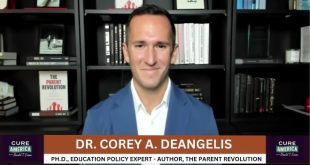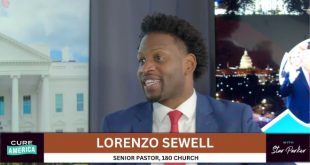If you missed yesterday’s livestream of scholars and policy leaders discussing The State of Black Progress: Confronting Government and Judicial Obstacles, the second volume of the Center for Urban Renewal and Education’s (CURE) policy book, you can watch the full event in the video below.
CURE and the American Enterprise Institute (AEI) co-sponsored this event — and it was awesome.
Star Parker, founder and president of CURE, joined AEI scholars Ian Rowe and Howard Husock, and Grace-Marie Turner, president of the Galen Institute, to discuss issues that matter to black Americans and the history and current state of affairs of black progress.
T.W. Shannon, CURE’s vice chairman, moderated the discussion.
Each of the participants shared their expertise about housing, education, health care, economic development, and financial empowerment — and which policies and factors have negatively impacted black progress.
Howard Husock, an expert on housing, talked about how subsidized housing has been especially harmful to the interests of black Americans and what we can do to solve the problem. He said that so-called affordable housing has “lured black households into dependency and long-term poverty, rewarded single parenthood, and especially led to the gnawing gap in homeownership and wealth accumulation.”
Education expert Ian Rowe, who runs low-income charter schools, began his presentation by discussing Brown v. Board of Education (1954), in which the U.S. Supreme Court ruled that “separate but equal” government schools were inherently unequal. Rowe said that civil rights activists consider Brown to be the greatest judicial decision of the 20th century.
But the ruling also meant schools “that had exclusively educated black students on a voluntary basis, even though laws did not require it” also could not exist. The term “inherently unequal,” Rowe said, carried devastating stereotypes of racial inferiority that have hindered black progress.
Grace-Marie Turner, an expert on health care policies, advocates private insurance over the government’s Medicaid program. Access to Medicaid is not access to health care, she said, and studies have shown that “there is little difference in outcomes between patients who are on Medicaid and those who are uninsured.” Turner said that this is an insult to people on public programs who have no other alternative.
“All Americans should be able to have the dignity of private insurance and not the promise of coverage that does not lead to access to care,” she said.
One of the problems is Medicaid’s low reimbursement to doctors. Turner shared a shocking anecdote about this.
Star Parker spoke about privatizing Social Security, an issue she’s spoken and written about for many years. There’s a huge wealth gap between white and black Americans. But allowing working people to invest the money they would otherwise pay toward Social Security would help them accumulate personal wealth.
Star said that “the most equitable way to close the wealth gap is to include low-wage and poor people into the phenomenon and miracle of compound interest by personalizing Social Security.”
The panel answered questions from the audience, and the entire discussion was truly wonderful and thought-provoking. And the time went by too fast.
You may pre-order The State of Black Progress, which will be available in March.
 CURE News and Clergy Blog News and Commentary for Christians
CURE News and Clergy Blog News and Commentary for Christians



